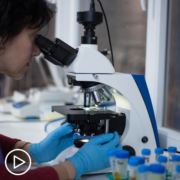What Are the Potential Benefits of an Advanced Non-Melanoma Skin Cancer Clinical Trial?
What Are the Potential Benefits of an Advanced Non-Melanoma Skin Cancer Clinical Trial? from Patient Empowerment Network on Vimeo.
Clinical trials are an option for some advanced non-melanoma skin cancer patients, but what are the potential benefits? Dr. Diwakar Davar shares his perspective on why patients should consider trial participation.
Dr. Diwakar Davar is the Clinical Director of the Melanoma and Skin Cancer Program at UPMC Hillman Cancer Center. Learn more about Dr. Davar.
See More from Evolve Non-Melanoma Skin Cancer
Related Resources

|

What Is Advanced Non-Melanoma Skin Cancer and How Is It Staged? |

Advanced Non-Melanoma Skin Cancer: Who Is on Your Healthcare Team? |
Transcript:
Katherine:
Dr. Davar, thank you for that detailed information. It is really valuable. You mentioned, a few moments ago, clinical trials. What are the benefits of participating in a clinical trial?
Dr. Davar:
Well, the first and the most important benefit of participating in a clinical trial is that oftentimes, your team is larger. Normally, a patient has a doctor. We have a PA and we have a nurse taking care of them. When you have a clinical trial, at that clinical trial, you have three, four, five times that number of people taking care of you. There are research nurses, research coordinators, nurse navigators, and all of these people are looking over your chart helping the doctor cross-check and check to make sure that nothing falls through the cracks.
The first and the most important thing is when you enter a clinical trial, your team grows. You have a primary physician taking care of you, but he has more help and more support. That helps ensure that the best possible care is delivered for our patients. The second benefit of taking part in clinical trials is that you oftentimes have access to the latest and the greatest.
For example, in the context of non-melanoma skin cancer that is transplant associated, these provocative approaches that are being tested, immune augmentation of immune suppression with concurrent systemic immunotherapy without causing allograft rejection, this is only available in the context of an NCI, ECTCN funded trial that Dr. Lipson is leading. If you’re not a member of one of the ECTCN sites, you do not have access to this trial. If you’re not a patient that is being seen at one of these sites, you, unfortunately, do not have access to this trial.
The key thing here is, entering a clinical trial represents the ability, potentially, to get a treatment that potentially could improve cancer and save one’s life without causing allograft rejection. In the context of the RP1 study, you could potentially be getting a drug that doesn’t cause allograft rejection and causes cancer aggression in a significant number of patients, but again, it is not a standard of care agent.
Entering clinical trials helps you because it allows you access to the latest and the greatest in terms of treatment modalities, but also, it allows you to receive the best possible care.










